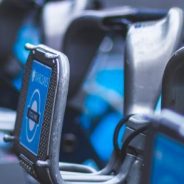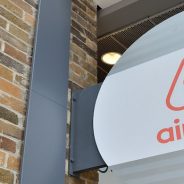Search results for Where Should I Work:
Friday News – Vanderbilt Receives STEM Designation, Michigan Ross Honored by AACSB, and More
Let’s take a look at some of the biggest stories from this week, including the new Vanderbilt STEM designation at the university’s Owen Graduate School of Management.
Vanderbilt MBA Finance Concentration Receives STEM Certification – News & Events
The Owen Graduate School of Management at Vanderbilt University has announced that, starting this fall, its finance concentration will be a STEM degree program. This gives international students the opportunity to extend post-completion Optional Practical Training (OPT) in the US by 24 months.
Sue Oldham, Associate Dean, MBA Programs Operations, says, “We were able to work with our faculty to ensure that this STEM designation in the Finance concentration is one that would have an immediate impact, not only for our current students but for all prospective students… [It] is a direct result of the leadership team here listening to what our students are saying, specifically our international students.”
The OPT program enables international students to remain in the United States for 12 months in order to receive work training. With the new STEM designation, this period has been extended an additional 24 months for international finance students to build their careers. For more on the new Vanderbilt STEM designation, click here.
Michigan Ross Dialogue About The Future of Business Named for “Innovation that Inspires” – Michigan Ross News Blog
A discussion that took place last year at the University of Michigan Ross School of Business has been selected by the Association to Advance Collegiate Schools of Business (AACSB) for its contribution to academic thought and practice across the b-school community and the world at large.
“Working Toward Shared Prosperity: An Academic-Executive Dialogue,” included academics, along with business, labor, government, and nonprofit leaders who seek to improve conditions of employment and economic growth via practical solutions. Participants and attendees of the discussion came away with renewed energy toward enabling their academic work to address real world issues.
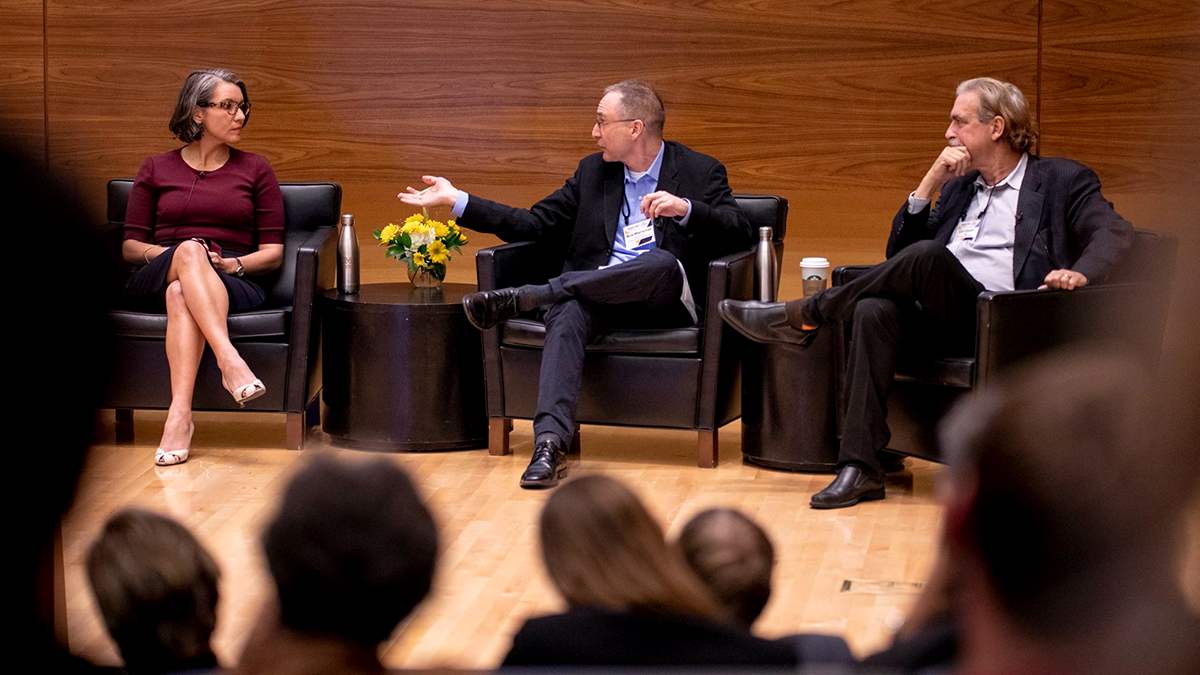
“Working Toward Shared Prosperity: An Academic-Executive Dialogue” earned the coveted 2019 Innovations That Inspire designation by the Association to Advance Collegiate Schools of Business (AACSB) / Photo via michiganross.umich.edu
The talk was a partnership between Michigan Ross and The Aspen Institute. Read more about the discussion, the AACSB, and the Aspen Institute here.
Economic and Environmentally Sustainable Solutions at the Forefront for the University of Toronto’s NeXus Consulting Group – Rotman News
The University of Toronto’s Rotman School of Management announced five of its MBA students joining its consulting group, NeXus Enterprises, which focuses primarily upon sustainability and social impact in its practice.
Founded in 2005, NeXus has worked with clients in 10 different countries to assist them in business planning, market research, financial modeling, scaling and expansion efforts. John Visser, a NeXus board member, says, “Social impact organizations are being challenged to deliver more value than ever before. Recent NeXus teams have executed a range of projects that have enabled boards and management teams to take their organizations to the next level.”
The new members of NeXus, all 2020 graduates of the Rotman MBA program, bring their expertise in technology, healthcare, marketing, design, engineering and construction to the group. Read here for more on NeXus and the Rotman team.
Marrying Science and Business Education For A More Sustainable Tomorrow – Fox School News
An industrial ecology project team at Temple University’s Fox School of Business, featuring an MBA student, a legal studies professor, and an engineering professor, have set an admirable example of how to meld disciplines.
Legal studies professor Daniel Isaacs Civil and Environmental Engineering Assistant Professor Avner Ronen, and MBA Vidya Sabella collaborated to solve a pressing problem: reducing wastes created by businesses.

(Left to right) Daniel Isaacs, Avner Ronen, and Vidya Sabbella / Photo via Joseph V. Labolito
Professor Isaacs (who is also head of the Global MBA program) says, “Business, technology, science and education should not be siloed. With broader educational opportunities like this one, environmental issues can be the drivers of innovation…Students and leaders alike need to start thinking about business in terms of what their obligations to future generations should be.”
You can read more about the team and project here.
MIT Food Systems Lab Announces Seven New Seed Grants – MIT News
The Abdul Latif Jameel Water and Food Systems Lab (J-WAFS) announced a new round of funding for an array of projects that will further innovation in farming and sustainable supply chain management in multiple countries. MIT Sloan is among the branches of the school to receive grant money.
Among the other innovations and developments will be increased food safety for everyday consumers; productivity technologies for small farmers, and water filtration methods for eliminating pollutants to food supplies. Thirty-four research teams applied for funding, and the directors of J-WAFS were tasked with choosing the best of the best.
Renee Robins, Executive Director of J-WAFS, says, “The broad range of disciplines that this applicant pool represents demonstrates how meeting today’s water and food challenges is motivating many diverse researchers in our community.”
Find more details on the seed grants and their recipients here.
MBA Career Comparison: Finance Manager vs. Product Manager
Finance and product management are two possible career paths that MBA graduates would do well to consider.
Both roles deal with large-scale coordination of many moving parts. Finance managers consider the total financial health of a business, including long-term planning and investment activities. Product managers, on the other hand, oversee the development of a product or feature from inception to launch, which involves creating a business strategy and fine-tuning a product’s function. To get a better understanding, check out our breakdown of the professions below.
The Top U.S. Entry Level Jobs and Internships of 2019
While work life balance, benefits, growth potential, and job security all factors to consider in your job search, the fact is that base compensation is more than likely the high priority. Getting an MBA is a sure way to increase earning potential, but where should you begin to look for the best internships and entry level jobs in such a vast and competitive playing field?
Glassdoor recently published its report on the highest paying internships and entry level jobs of 2019. We’ve broken down the report to help our readers discover just which of these positions and companies can offer them the best places to put their MBA talent to work.
Top 5 Entry Level Jobs for MBAs
One of the many pieces of good news from Glassdoor’s report is that as the number of tech jobs continue to increase, so does the need for business minded workers. This, along with the fact that finance and consulting positions follow right behind tech on the highest paid jobs list, should make b-school students optimistic for their prospects.
Product Manager
Product Management is a key role for any organization in the business of turning ideas into profit. According to blogger Dan Driscoll, who wrote a definitive article on the role, PMs are “closet-creative types with an ambitious acumen for business fundamentals and priorities, as well as masters of persuasion and consensus-building.”
Strong analytics skills along with a creative approach to problem solving are key for these positions. Engagement in design, development, support and marketing are all features of this role, which has a median base salary of $89,000 to start.

Major firms, such as Salesforce, are currently looking for top-tier product management candidates.
Investment Banking Analyst
Financial modeling, business valuation methods and strong presentation skills are just a few of the factors that comprise the Investment Banking Analyst role. The nuts and bolts of finance firms are the responsibility of the investment banking analyst, as they track live transactions along with M&A and private equity transactions.
At a starting median base salary of $85,000, this job is a great foundation on which to build a career.
Implementation Consultant
Implementation, according to coaching and recruiting site Firm Consulting, is one of the three main branches of consulting as a whole. Implementation teams take recommendations from Strategy and Operations consulting teams and turn them into realities. For instance, a company may be deciding to create a new division. Strategy and Operations consultants determine how best to profit from this, and implementation consultants make it happen.
ICs brand, execute and set up the division in this scenario, including relocation if necessary, along with on-boarding procedures. The starting base pay for ICs is $72,000.
Actuarial Analyst
Actuarial Analysts, who make a starting median salary of $66,250, are the workhorses of the insurance industry. Using statistical models, they analyze the probability and cost of various events (injury, accidents, and product failure, for example), and use this data to determine insurance policy pricing. Certification by either the Society of Actuaries (SOA) or the Casualty Actuarial Society (CAS) is required for these positions.
Actuaries must pass seven exams for the CAS and five in the SOA. This generally happens within a four-to-six year period, but students can begin the test while still enrolled in school. After passing the first and second exams, a student can start their first job. The ‘fellowship’ level of certification takes place over an additional two-to-four years.
According to the U.S. Bureau of Labor Statistics, the role of Actuarial Analyst has a 22 percent growth rate projected up to the year 2026.
Business Analyst
Business Analysts are key team players who make certain that companies’ current systems are as efficient as possible, and who develop strategic plans for growth. As agents of change, Business Analysts identify growth opportunities and reduce costs during these changes. Business Analysts work closely with IT departments to ensure that the best technologies are in place, and they also serve as a link between different departments of a company to ensure consistency.
Therefore, communication, diplomacy and a strong understanding of each business function are vital to success in this role. The four major components of development, modeling, process design (workflow creation), and systems analysis are the basic elements of the Business Analyst role.
To start, Business Analysts make a median salary of $63,000.
Top 5 Highest Paying Internships
Facebook leads the pack in paying its interns $8,000 per month, followed by: Amazon at $7,725; Salesforce at $7,667; Google, which pays $7,500, and Microsoft, offering interns $7,250 monthly.
Facebook tops Glassdoor’s 2019 ranking of the top-paying U.S. internships, with interns pulling in an estimated $8,000 per month
Each of these companies have highly competitive university recruitment programs. For details, see Facebook Careers, Student Programs at Amazon, Salesforce University Recruiting, Google Student Internships and Microsoft University Internships.
Those graduating now or in the near future from MBA programs have a solid advantage in today’s market; job growth is high in the U.S. and unemployment is low. While these high paying jobs and internships are clearly appealing for a reason, keep in mind that more intangible factors like company culture and proven trust in management are the things that will sustain you regardless of salary.
Executive MBA
Beedie School of Business Executive MBA Program Structure
Simon Fraser’s University Beedie School of Business offers two Executive MBA programs at its Segal Graduate School of Business: the Executive MBA; and the Executive MBA in Indigenous Business & Leadership (EMBA IBL). The standard EMBA program takes approximately 20 months to complete and the EMBA IBL takes an estimated 25 months. Both are held at the school’s downtown Vancouver campus. EMBA classes take place on alternating weekends. EMBA IBL classes take place for one or two weeks per course.
Both of the Beedie EMBA programs are built for mid-career professionals, with the Executive MBA in Indigenous Business & Leadership designed specifically for indigenous professionals. Those in the EMBA program also have the option to take the Americas MBA for Executives stream, which features residencies at four different business schools in the second year, of which include: The Beedie School of Business; the FIA Business School in Sao Paulo, Brazil; the ITAM, Instituto Tecnológico Autónomo de México in Mexico City; and the Vanderbilt University Owen Graduate School of Management in Nashville, U.S.A.
Curriculum
The first three terms of the EMBA program focus on “managerial skills, building on your existing work experience,” according to the business school. These initial terms, starting in September, begin with an orientation, leading to team exercises, and core coursework in subjects such as accounting and business ethics. The final three terms of the program are designed for more experiential learning, infusing elements of the EMBA IBL program, as well as career preparation, and the final capstone project. Students completing the Americas MBA for Executives stream will begin their four residencies in the second summer term, beginning in Vancouver (August), then Brazil (October), Mexico (February), and ending in Nashville, U.S.A (April).
EMBA IBL students begin the program in fall, starting with the orientation segment, similar to the standard EMBA program. The first semester is dedicated to core learning, featuring subjects like Leadership and Teamwork and Business Communication. In the second term, students will travel to the Native Nations Institute in Tucson, Arizona, for a field study, before continuing more traditional MBA courses, like Accounting for Decision Making. No summer term takes place during the first year. However, the final five terms of the program features a summer semester, in which students begin working on their final capstone project, which is completed in the subsequent fall term. The program concludes the following spring.
Class Profile
The SFU Beedie EMBA class typically features about 33 percent female students and 67 percent male students, of which are, on average, 41-years old. The average work experience is about 18 years per student.
Tuition, Scholarships, and Financial Aid
The SFU Executive MBA at the Beedie School of Business costs an estimated $57,100 CAD, while the EMBA IBL program costs $55,500 CAD. These costs cover most expenses, including materials, workshops, off-site orientation, and more. Travel expenses and other accommodation are not included in price estimates. A $1,000 fee is also required to hold a spot in the EMBA program after earning acceptance. A $250 fee is required for the EMBA IBL program.
Information on scholarships and external financing for the EMBA IBL program can be found here. Federal and private loans may vary, depending on the origin of the applicant. Most international applicants are subject to private loan options.
Admissions
Applicants to the SFU Executive MBA program at the Beedie School of Business should have a minimum of 10 years of prior work experience, at least four years of previous management experience, and are currently employed. Prospective applicants must have an accredited Bachelor’s degree with at least a 3.0/4.33 (B) GPA, or a 3.33/4.33 (B+) GPA in the last 60 credits of undergraduate coursework, or, a CA, CMA, CGA, CPA, CGA or PEng professional designation. Those with a GPA lower than 3.0/4.33 (B), but have substantial professional experience, may be admitted. The GMAT is not required but can help strengthen one’s application.
Applicants to the SFU Executive MBA program must also submit the following:
• A completed application
• Official transcripts
• Three letters of reference
• Application fee of $90 (Canadian residents) or $125 (International residents)
• A self-evaluation
• An organizational chart
• Current Resume
• GMAT/GRE scores (if needed)
• Proof of English proficiency (if needed)
Applicants to the Executive MBA in Indigenous Business and Leadership program must have previously earned an undergraduate degree, regardless of the field, or a two-year technology degree with strong grades, five to ten years of work experience and at least four years of management experience, and proof of English proficiency, if necessary.
EMBA IBL applicants must also provide:
• A completed application
• Application fee of $90 (Canadian residents) or $125 (International residents)
• A self-evaluation
• An organizational chart
• Current Resume
• Proof of English proficiency (if needed)
• GMAT/GRE scores (if needed)
• Three letters of reference
Application deadlines are as follows:
- Round 1: November 19, 2021
- Round 2: February 25, 2022
- Round 3: May 13, 2022
- Final Round: June 24, 2022
School v. School: Queen’s University Smith School of Business vs Toronto Rotman School of Management
Apples or oranges? Steak or chicken? Toronto or Kingston, Ontario? If you’re having a difficult time making a decision, you’re not alone. When it comes to choosing the best MBA program for your needs, there can be more than one choice that seems like the “perfect” fit, so how make a final decision? It’s not easy, but that’s what we’re here for.
Our School v. School series offers a point-by-point comparison of two highly respected MBA programs in Ontario: Queen’s University Smith School of Business and the University of Toronto Rotman School of Management. Keep reading to see how each school stacks up. Continue reading…
Full-Time MBA
Beedie School of Business Full-Time MBA Program Structure
The Simon Fraser full-time MBA at the Beedie School of Business is a 12 month program, combined with a four month internship. Before classes start in the fall, students complete pre-MBA online courses, such as Excel and Financial Accounting, establishing a base education for the program. After completing core coursework in the first two semesters, students are introduced to the international leg of the program, moving into creative coursework, workshops, and the final capstone project. At the conclusion of the 12 months, the optional internship portion begins, acting as the final element of the program. Those that have a permanent, full-time role lined up do not have to take the internship at the end of the program.
Curriculum
The first semester of the program is dedicated to essential core courses, with classes centered around Essential Business Skills. Following the spring semester is built around organizational dynamics, which features, "intense, multi-day business simulations; mock company scenarios where everyone is assigned a specific role."
The international portion of the program, between the spring and summer semesters. Previous classes traveled to countries such as Argentina, Brazil, Colombia, and more. The final semester, prior to the optional internship portion, is dedicated to post-MBA career work, featuring career workshops, resume assistance, and mock interviews.
Class Profile
The full-time MBA class at the Beedie School of Business earned an average GMAT of 620 and have five years of previous work experience. The average age is 29, with 52 percent female students and 48 male students.
Tuition, Scholarships, and Financial Aid
For Canadian citizens and permanent residents, tuition for the Simon Fraser full-time MBA program is about $42,135 CAD. The cost is $55,825 CAD for international applicants. Textbooks and other materials cost an estimated $2,200 CAD, and student fees are an additional $2,500 CAD. A $2,000 CDN fee is required to hold a spot in the program after earning acceptance.
Transportation costs of international travel experiences are also not included in the estimated tuition fees, which should range between $5,500-6000 CAD. All Business & Indigenous Communities courses are an extra $250 CAD.
About 50-60 percent of students earn merit based scholarships within the program, which do not require any application process. Scholarship funding can range from $2,000-20,000 CAD.
Federal and private loans may vary, depending on the origin of the applicant. Most international applicants are subject to private loan options.
Admissions
Prospective applicants must have an accredited Bachelor's degree with at least a 3.0/4.33 (B) GPA, or a 3.33/4.33 (B+) GPA in the last 60 credits of undergraduate coursework. Two years of work experience is required, although the school suggests each student has at least four years of experience. The GMAT is required, with a minimum score of 550. The GRE is also accepted, with a minimum score of 150 required for each section. A competitive GMAT average is at least 600 and the GRE average is about 310.
Applicants that have completed the Graduate Diploma in Business Administration (GDBA) may be able to have some courses waived for the program. In addition, those that had completed the GDBA with a GPA of 3.5 or more can waive the GMAT requirement.
Applicants must also submit the following:
• A completed application
• Official transcripts
• Two letters of reference
• Application fee of $90 (Canadian residents) or $125 (International residents)
• Resume
• GMAT/GRE scores (if needed)
• Proof of English proficiency
Face to face interviews are a required element of the admissions process.
Application deadlines are as follows:
- Round 1: November 27, 2020
- Round 2: January 29, 2021
- Round 3: April 2, 2021
- Final Round: June 18, 2021
Top MBA Recruiters: IDEO
If you’re interested in international design and consulting, IDEO (pronounced eye-dee-oh) should be on your radar. Launched in Palo Alto, CA in 1991, the company is known for using design-thinking methodology to design its products, services, environments, and digital experiences. They’re involved in a wide range of consumer products (toothbrushes, computers, personal assistants, etc.) experiences (non-traditional classrooms), as well as management consulting and organizational design.
Known for designing the first manufactured mouse for Apple, IDEO leads the way for human-centered design. As their website says, “IDEO has long been at the forefront of creating change through design.” Continue reading…
International MBA
UBC Sauder School of Business International MBA Structure
The UBC Sauder School of Business’ Robert H. Lee Graduate School International MBA is a 20-month part-time program taught at the Antai College of Economics and Management at Shanghai Jiao Tong University. The program is designed for Chinese business professionals seeking an global academic experience, complete with a trip to Vancouver.
Students start the program in November, with eight foundational courses, taught in Shanghai. In April/May of the first academic year, students complete the mandatory Vancouver, Canada residency, before returning to Shanghai to complete their Capstone project. Students also have the option to return to Vancouver to attend a graduation ceremony.
Classes are taught mostly on weekends. Friday classes last from 3:30 – 10 p.m., with Saturday and Sunday classes running from 9 a.m. to 5 p.m. Individual classes are taught over one weekend, with exams taking place on the first day of the successive class.
Curriculum
The IMBA foundation courses, taught at Jiao Tong University, include the following:
• Business Strategy
• Corporate Finance
• Foundations in Accounting
• Foundations of Managerial Economics
• Marketing
• Operations & Logistics
• Organizational Behaviour
• Statistics
• Integrated Project
These courses are completed from the first month of the program, beginning in November, until July. At the end of April, students complete the two-week residency at the Vancouver UBC campus. The final 12 months of the program are comprised mostly of advanced courses, of which include:
• Accounting
• Financial Reporting
• Financial Statement Analysis
• Entrepreneurship
• Finance
• Investments
• Human Resource
• Managing Change
• Two Party Negotiations
• Brand Management
• Services Management
• Supply Chain Management
• Process Fundamentals
• Strategy
• Corporate Strategy
• MIS
• Managing Information Technology
Like the full-time and Professional MBA options at UBC Sauder, students in the IMBA program complete Career and Professional Development programming through entirety of their schedule, of which includes workshops, networking events, and more. An additional Global Network for Advanced Management module may be available for select students, allowing them to travel abroad even more for their global education.
Class Profile
The average age of the UBC Sauder International MBA class is 34-years old. About 42 percent of the most recent class is male, with 58 percent female students. In total, the class featured 45 students. The average amount of previous work experience is 11 years. More than 90 percent of the class originate from China.
Tuition, Scholarships, and Financial Aid
The total cost of the UBC Sauder International MBA program is $60,000 USD, payable in two separate installments. An additional $2,500 fee is required to hold a spot in the program. Additional costs are as follows:
| Expenses | Cost (USD) |
|---|---|
| Optional Prep Program Fee | $150 for each individual course, or, $400 for all three |
| Optional Global Network for Advanced Management (GNAM) | $5,600 |
| Vancouver Flight | $1,000 |
| Accommodation in Vancouver | $2,100 |
| Medical Insurance | $100 |
| Transportation | $80 |
| Food and Other Expenses | $700 |
The total estimated cost, with all other fees, insurance, travel, and miscellaneous factors included, is about $69,980.
Outstanding students may be rewarded a UBC International MBA Entrance Scholarship, which can range anywhere from $1,000 to $6,000. The range of the scholarship is dependent upon the time of application, with earlier applicants given higher scholarship opportunities.
Private and federal loan funding may be available, per student.
Admissions
In order to apply to the UBC Sauder International MBA program at the Robert H. Lee Graduate School and the Antai College of Economics and Management at Shanghai Jiao Tong University, applicants must have earned a three-or-four year undergraduate Bachelor’s degree from an accredited institution while maintaining a GPA of at least a ‘B+’ (76 percent or 3.3). There is no minimum GMAT/GRE score requirement, but the suggesting GMAT minimum is 550 and in the 50th percentile for each test section. GRE scores should be at least 155 for the verbal and quantitative sections. At least two years of full work experience is also required. However, it is suggested that applicants have at least five years of prior experience.
Applicants must also be able to speak fluent English in order to enroll. For those who did not earn an undergraduate degree in Canada, the U.S., or UK, or didn’t earn a degree from a predominantly English-speaking academic institution, TOEFL/IELTS/CAEL scores are required. Applicants must score a minimum of 80 on the TOEFL exam, 6.5 on the IELTS, or 70 overall on the CAEL.
The following must also be submitted:
• A completed online application
• Official transcripts
• $143 CAD application fee
Application deadlines are as follows:
Round Two – June 11, 2019 (final deadline for scholarship consideration)
Final Round – August 27, 2019
Professional MBA
UBC Sauder School of Business Professional MBA Structure
The Professional MBA program at the UBC Sauder School of Business’ Robert H. Lee Graduate School is a 24-month part-time program with classes taking place once every two-to-three weeks, complete with winter and summer breaks and three, eight-day Professional Residencies held each January in the program, and the final month of the program.
Assisting with student’s full-time employment schedules, exams are held completely online.
Curriculum
The program begins in January with the first of three residencies. Following the introduction to the program, Professional MBA students complete foundational courses in the first year. The second year is dedicated to Advanced Courses and optional Global Network of Advanced Management Small Network online courses. Through the entirety of the program, students complete hands-on Career and Professional Development programming, of which includes workshops, networking events, and more.
Class Profile
The most recent UBC Sauder class features 47 students, of which 60 percent were male students and 40 percent were female students. The average work experience of the class was seven years and the average age was 31-years old.
Career Statistics
Upwards of 90 percent of Professional MBA students advanced their careers after earning the degree.
Tuition, Scholarships, and Financial Aid
The total cost of tuition for the UBC Sauder Professional MBA program at the Robert H. Lee Graduate School is $48,450 CAD for Canadian residents and $80,060 CAD for international residents. A non-refundable $2,500 CAD deposit is required to hold a spot in the program upon admission.
Total tuition and fees are as follows. Note, these figures do not include cost of living in Vancouver:
| Expenses | Cost (CAD) |
|---|---|
| Tuition | $48,450 (Canada Resident) $80,060 (International Resident) |
| Student Fees | $2,600 |
| MBA Student Building Fee | $1,600 |
| MBA Society Fee | $400 |
| Supplies | $3,000 |
Early entrance scholarships of $1,000 CAD and $2,000 CAD are offered to applicants that apply before select MBA deadlines (see: below). Federal and private loans may be available to select applicants to help fund their educational needs. However, international students, unless the payment is provided via their employer, likely can only sign for private loan funding.
Admissions
In order to apply to the UBC Sauder Professional MBA program at the Robert H. Lee Graduate School, applicants must have earned a three-or-four year undergraduate Bachelor’s degree from an accredited institution while maintaining a GPA of at least a ‘B+’ (76 percent or 3.3). GMAT scores must be, at a minimum of 550 and in the 50th percentile for each test section. GRE scores should be at least 155 for the verbal and quantitative sections. However, the school suggests applicants score around 650 on the GMAT and 320 on the GRE. A minimum of three years of prior work experience is also required, although the current average is seven years per student.
The following must also be submitted:
• A completed application
• Official transcripts
• A current resume
• $143 CAD application fee
• Letters of reference
• GMAT/GRE scores
• Proof of English proficiency (if necessary)
• Essays
Strong candidates will be asked to conduct an in-person interview on the UBC Sauder campus.
Application deadlines are as follows:
Round One – May 31, 2019 ($2,000 CAD scholarship deadline)
Round Two – July 18, 2019 ($1,000 CAD scholarship deadline)
Final Round – Oct. 9, 2019
Full-Time MBA
UBC Sauder School of Business Full-Time MBA Structure
The full-time MBA program at the UBC Sauder School of Business is a 16-month AACSB-accredited program taught at the university’s Robert H. Lee Graduate School. Beginning in August, the program is built around five separate critical themes: creativity; decision making; global issues and marco-economics; ethics and sustainability; and leadership development.
The first two periods (or, terms) of the full-time MBA at UBC feature core coursework, with elective courses built around the student’s selected career tracks integrated from the third to the seventh periods of the program. At the tail end of the third period (late February and early March), students attend a mandatory two-week trip abroad, adding a significant global business experience element to the program. Expertiential learning practices, including a student internship, are introduced in the fourth period, lasting until the seventh period, where students conclude the program with a Capstone project.
Curriculum
The foundation courses of the UBC Sauder full-time MBA include the following topics: Accounting; Intro to Finance; Organizational Behavior; Marketing Fundamentals; Operations Fundamentals; and Managerial/Micro Economics. Specified career tracks, which integrate a student’s electives, include: Finance; Product and Service Management; and Innovation and Entrepreneurship. A custom career focus is also available for entrants, combining some of the aforementioned specializations.
Class Profile
The most recent UBC Sauder full-time MBA class features 97 students, 66 percent of which were male and 34 percent of which were female. About 51 percent were of international distinction. The age range of the class was 24-41-years old and the average work experience upon entry was five years.
Career Statistics
An estimated 85 percent of the most recent UBC Sauder full-time MBA class was employed within three months of earning their degree, with an average annual salary of $85,289 CAD.
Tuition, Scholarships, and Financial Aid
The total cost of tuition for the UBC Sauder full-time MBA program at the Robert H. Lee Graduate School is $48,450 CAD for Canadian residents and $80,060 CAD for international residents. Combined with the cost of living in Vancouver, and the Global Immersion fee, and an additional CAD course fee, the total cost of the program for Canadian residents will cost more than an estimated $105,000 CAD. Cost of living and other fees are the same, regardless of student residency. However, with the increased tuition rate, international students living full-time in the city should expect to pay more than $137,000 CAD for the entire program.
An estimated 25-40 percent of the class are automatically awarded merit-based scholarships upon entry. However, external scholarships may also be available.
Federal and private loans may be available to select applicants to help fund their educational needs. However, international students, unless the payment is provided via their employer, likely can only sign for private loan funding.
Admissions
In order to apply to the UBC Sauder full-time MBA program at the Robert H. Lee Graduate School, applicants must have earned a three-or-four year undergraduate Bachelor’s degree from an accredited institution while maintaining a GPA of at least a ‘B+’ (76 percent or 3.3). GMAT scores must be, at a minimum of 550 and in the 50th percentile for each test section. GRE scores should be at least 155 for the verbal and quantitative sections. However, the school suggests applicants score around 650 on the GMAT and 320 on the GRE. A minimum of two years of prior work experience is also required, although most students are expected to have at least three years of prior experience, with the average currently at five years per student.
The following must also be submitted:
• A completed application
• Official transcripts
• A current resume
• $143 CAD application fee
• Letters of reference
• GMAT/GRE scores
• Proof of English proficiency (if necessary)
• Essays
Strong candidates will be asked to conduct an in-person interview on the UBC Sauder campus or via Skype.
Next Application Deadline
Domestic: Jan 6th, 2022
International: Jan 6th, 2022
The Best New Investment MBA Jobs
Investment firms typically act as intermediaries between investors and corporations. They are also popular landing spots for MBAs to bring their talents after earning their degree. There are exciting new positions out there for both new grads and seasoned workers alike. Here’s a look at some of the best new MBA jobs in the investment banking sector: Continue reading…
Executive MBA
Muma College of Business Executive MBA Program Structure
Beginning in August and concluding in May of the student’s second year, the Muma College of Business Executive MBA program at the University of South Florida is a 21-month AACSB-accredited program built for students that have ten-or-more years of professional experience prior to enrollment. Classes meet on alternating weekends, typically on the first Friday and Saturday of the month and then on a Saturday two weeks after.
Curriculum
The USF EMBA program is structured around six specific areas of study: administration and control; decision making; human capital; managing a task environment; strategy and innovation; and technology and logistics. The program begins in August with a two-day orientation session and a three-day residency, followed by regular class schedules.
In addition to the required coursework in the classroom, all USF EMBA students must complete an international trip component of the program in the late spring/early summer months between the first and second year. Students in the program recently traveled to China, Brazil, South Korea, and Costa Rica.
Class Profile
The average age of the Muma College of Business EMBA class is 38-years old. About 17 percent of the class has already earned an advanced degree prior to enrollment.
A total of 61 students are enrolled in the current cohort, with 73.8 percent male students, 26.2 percent female students, and 36.1 percent U.S. minority students. The undergraduate GPA mean is 3.29 and the average work experience per students is 15.4 years.
Tuition, Scholarships, and Financial Aid
The cost of the University of South Florida Executive MBA program at the Muma College of Business is currently $47,500. This includes cost of tuition, supplies, and more. A nonrefundable deposit of $1,500 is due upon acceptance in order to hold a spot in the program. Travel expenses are not included in the final cost estimate, which may change after the start of the academic year.
The Elizabeth Lindsay Scholarship awards new or returning senior year EMBA students $8,500 per academic year, designed primarily for self-employed students, or those working for a smaller company, and living in Sarasota or Manatee county.
Students may be able to fund their education through federal or private loans, although international students are limited to just private loans, if needed. Select U.S. military veterans may be able to have their education funded through the USF Veterans Service and the 9/11 GI Bill.
Admissions
In order to apply to the University of South Florida Executive MBA program, applicants must have graduated from an accredited four-year university, plus a minimum of five years of previous management experience. The following must also be submitted to the admissions team:
• A completed graduate application
• Proof of Florida residency
• An EMBA preliminary application
• Corporate Approval form
• Official transcripts
• A current résumé
• Two letters of recommendation (sealed)
• Statement of Purpose
• $30 application fee
• Proof of English proficiency (if necessary)
A personal interview will be conducted for strong candidates. During the interview, applicants will received assessment of whether or not they need to submit GMAT scores.
Applications should be submitted prior to July 1. However, the program maintains a rolling admissions policy.
Top MBA Recruiters: Slack
In a job landscape continually dominated by newer tech companies, many MBAs have chosen a tech-focused specialty in their future career plans. Among the companies with the greatest need for MBA talent are those that are in growth stages. Founders of startups or early stage ventures are not always certain of how to manage the finer points of finance, marketing, project management, and accounting. As they grow, so does their need for strong MBA candidates to attend to these details.
Tech companies specializing in cloud-based collaboration software are always on the hunt for new talent. Slack, Inc., for example, is a leader in a growing field of these communication tools, and its popularity is soaring. Here is a look at how and why a Slack career might be a wise front-runner on your job wish list.
The History of Slack, Inc.
Founded in 2013, Slack is still a relatively young company. Its recent acquisition of the assets of Atlassian’s enterprise communication tools in 2018 speak to its prevalence. With Slack, employees can chat with one another and form discussions around topics and groups, all with the goal of making connection with your peers easier and more direct. All chats are searchable which makes for a dynamic storage system for companies of all sizes.
Seeking a Slack Internship?
On its University Recruitment site, Slack boasts that joining “fosters curiosity and celebrates creativity in an effort to help everyone—here at Slack and around the world—do their best work,” (which incidentally is one of the company’s motto’s.) By assigning interns to project teams that tackle real assignments, Slack prepares future employees for life at the company. Internships take place over a 12 or 16-week session during the summer or fall, with application deadlines in May and August. If an application is accepted, Slack offers a phone or video interview along with a take-home assignment before coming to a decision.
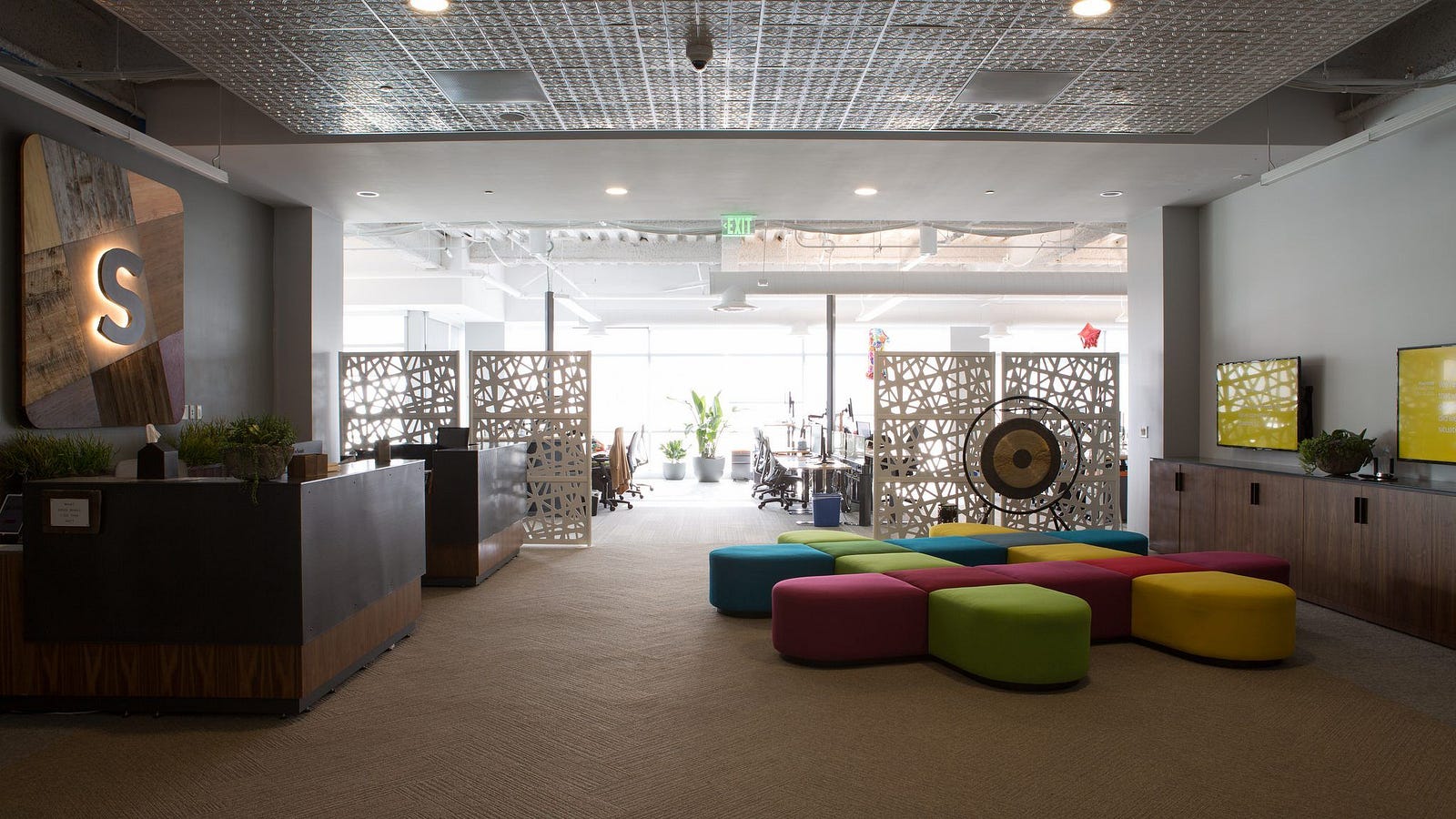
Those looking for an internship in the tech world should seek out Slack’s San Francisco headquarters.
Each intern is guided by a mentor, and can connect with executives and team leaders on a daily basis. Outside of the office responsibilities, Slack offers interns volunteer opportunities and networking as you build your resume. Currently, Slack’s San Francisco headquarters is seeking a Sales Strategy Intern. Ideally, candidates for the position will possess several years of prior management consulting experience, and will receive their MBA in 2020.
Applying for a Slack Career
One of Slack’s greatest assets is its diversity. According to a recent article in The Atlantic, “Slack has been outperforming other Silicon Valley companies, [in diversity of its workforce]. At Google, Facebook, and Microsoft, women hold between 19 percent and 28 percent of leadership positions … At Slack, women make up 31 percent of leaders and hold 34 percent of technical roles. Also … percentages of underrepresented minorities … are, in some cases, triple that of peer companies.”
This alone makes a Slack career appealing, but additional benefits are numerous. The company gives each employee $500 a year toward personal development, and $2000 annually toward professional development. One hundred percenter of health care expenses are covered for employees and their families, and $150 per month reimbursement for fitness/wellness memberships. Slack gives its workers “generous parental and new child bonding leave”.
Massage therapy, catered lunch and breakfast, game nights, and a ‘meeting-light’ culture round out the list of the company’s appealing perks.
Currently, there are close to 200 open positions at Slack both in the U.S. and abroad. Here is a look at just a few.
San Francisco
- Business Intelligence – Marketing and Business Intelligence – Product
- Data Scientists for Lifecycle and Product
- Corporate Development Manager
- Business Development Manager – Platform
- Various Accountancy Positions
New York City
- Business Intelligence Analyst, Product
- Sales Operations, Deal Strategy Lead
Denver
- Senior Systems Analyst
- Sales Operations, Senior Commissions Analyst
In Tokyo, Slack is seeking a Partner Manager, Systems Integrator Alliances along with a Head of Enterprise Marketing. In London, there is an open position for a Senior Analyst Relations Manager, and the Dublin office is in search of Accountant, along with a Customer Experience Specialist.
Slack Career Salaries
According to data gathered by Paysa, Slack’s San Francisco office pays an average of $183,997 per year. This falls within a range of $126,305 to $222,941. A breakdown of the average is as follows: $132,038 base salary; $34,566 in equity; $17,392 annual bonus, and a $9,641 signing bonus. For specific positions more in-line with MBA talent, a senior marketing manager earns an average base salary of $108,000
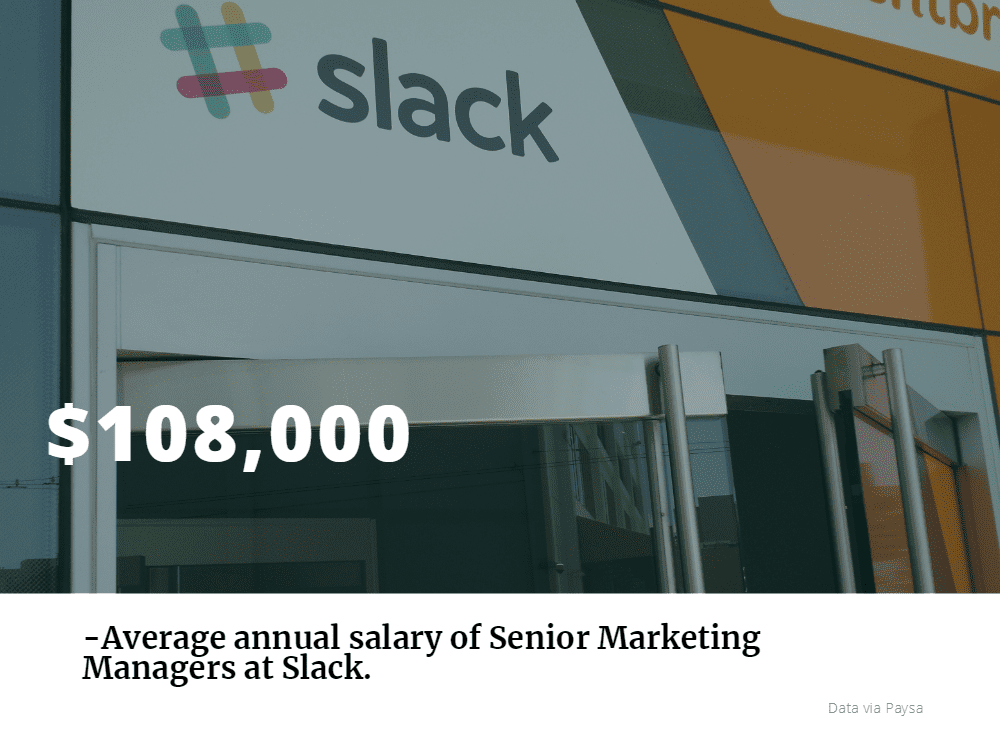
For a full listing of Slack’s current open positions along with application instructions, visit the careers site.
MBA Jobs: Business Strategy Manager
In order for businesses to succeed, it needs to have an excellent idea, leaders to sell that idea, and a staff to ensure that the idea can come to fruition. While it’s possible for one person to handle these responsibilities on their own, the lone ranger business model is not sustainable as the company expands.
Enter: the Business Strategy Manager, a role tailor-made for adept planners and creative problem-solvers.

What is a Business Strategy Manager?
Think of the business strategy manager as the glue of the C-suite. CEOs, COOs, CFOs, and other leaders all (theoretically) have excellent ideas for how to lead a company, but it is the business strategy manager’s job to transform raw ideas into a cohesive, realistic plan that drives the company forward, creates a profit, and develops a competitive advantage.
The best business strategy managers know what makes a company either sink or swim, and they use that knowledge to develop and execute their strategy.
Here is a representative sample of business strategy manager responsibilities:
- Strategy definition
- Strategic planning
- Strategic performance management
- Strategic risk management
- Data analysis
- Collaboration
How Much Does It Pay?
Given that business strategy managers work directly with the leaders of a company, the salary is competitive. According to Glassdoor, the average salary is $125,899. Business strategy managers can earn an average of $15,993 in cash compensation, which can go upwards of $40,000.

Getting Started
To start, all candidates should come from the business world. A BA/BS in a business-related field (e.g., finance, economics) is a must. Given the high level of this position, most candidates will not get a second glance if they do not have at least two years of rising strategy experience in a professional business setting, not to mention an MBA.
Since negotiation is at the core of the business strategy manager role, successful business strategy manners must have excellent communication and interpersonal skills. Candidates must be clear communicators and effective presenters. In addition, they must be able to develop relationships with both staff members and stakeholders.
In addition to the people skills, successful candidates will have strong analytical skills. Candidates must be able to translate complex financial data into plain language that can be easily understood by all stakeholders. The expectations placed on business strategy managers require that successful candidates are organized and excellent decision makers. They have to make decisions quickly and soundly. This job is well-suited for those who can keep their cool, no matter what is thrown at them.
Since an MBA degree is required to even be considered for the role, it is worthwhile to consider some schools that have strategy concentrations and can set you up for a future career as a business strategy manager.
University of Florida’s Hough Graduate School of Business
University of Florida’s Hough School of Business offers a flexible curriculum that allows students to start preparing for their careers during their first year of the two-year program. Combined with full tuition scholarships offered to full-time MBA students, Hough is an excellent opportunity for the strategically-minded.
Cornell’s SC Johnson School of Business
At Cornell’s SC Johnson College of Business, students receive a top-notch business education. In their second year, Cornell students can complete a concentration in strategy. This extra knowledge will help Cornell students stand out from the others.
Ohio State University’s Fisher College of Business
Ohio State’s Fisher College of Business is an elite business school that has just completed a curriculum redesign that puts students first. Fisher faculty and staff help students construct their MBA so that strategy is their primary concern, rather than just a concentration they complete during the second year.
Top MBA Recruiters: Airbnb
One of the great clichés of the tech industry is the notion of “disruption.” As in, nearly every app, website, or program will disrupt the way we previously conceived of our environment. All this talk of disruption in tech often amounts to a lot of hot air, but not so for Airbnb.
Initially founded as a way for two guys to earn a bit of extra income to cover astronomical San Francisco rent, Airbnb has become a leader in peer-to-peer property rental. Millions of people use the service each year to find temporary lodging in virtually every nook across the planet
As Airbnb’s popularity soars and the company continues to expand its services—it recently acquired HotelTonight, a discount hotel booking service—MBAs with interest in hospitality should consider these Airbnb careers.
Why MBAs Love Airbnb
Airbnb is a young company, launched in 2008. In that short time, it has established itself as a power player in the hospitality industry. With an IPO in the pipeline this year, the company is working to shore up its future. This means further expansion into new markets and new services to maintain company profitability. MBAs who long to play a vital role in the expansion of an already hot brand will find opportunities in spades at Airbnb.
Airbnb compensates MBAs well for their contributions. According to Glassdoor, MBAs who arrive as program managers can earn an average of $117,299 in base salary and $18,868 in a cash bonus. Those who receive stock bonuses can earn an extra $32,669.
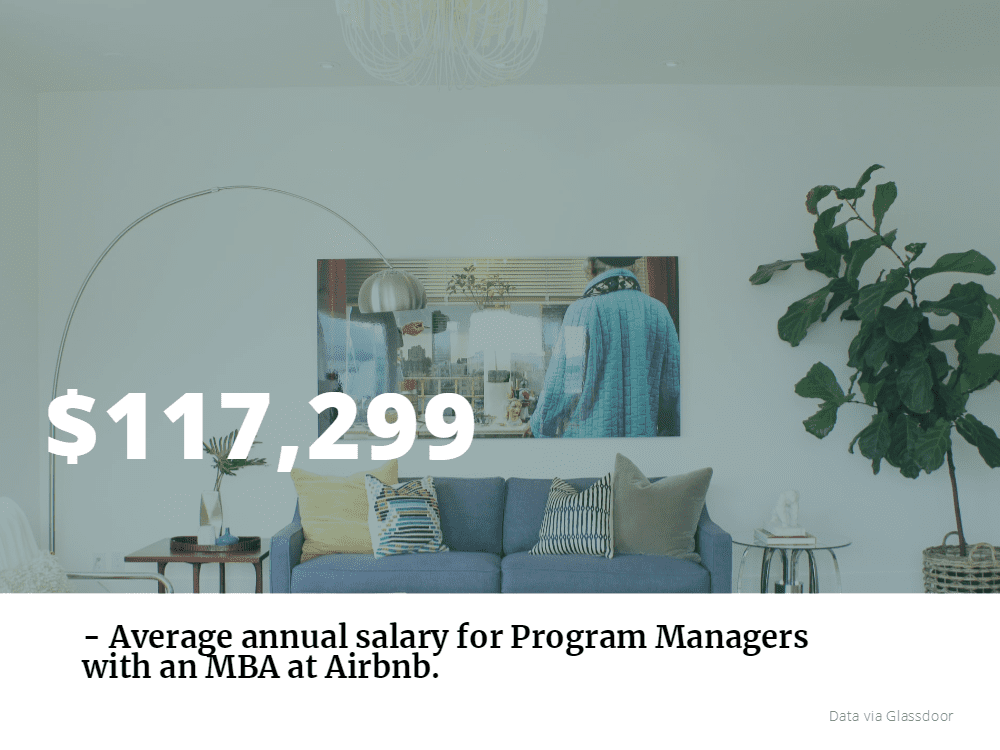
In addition to the salary, Airbnb careers have excellent benefits. Employees will find health care, dental care, 401(k), life insurance, and a complimentary snack pantry on pair with most Silicon Valley startups. However, Airbnb offers a few other unique perks.
To start, the company provides stipends to its employees to cover cellphone bills, continuing education, and commuting, whether by bike or by public transportation. In addition, Airbnb provides its employees with a $2,000 travel stipend to stay in any Airbnb property in the world, which essentially gives Airbnb employees gratis accommodations wherever they travel during their three weeks of annual PTO.
Life at Airbnb
One might gather that Airbnb encourages its employees to maintain a healthy work-life balance, which many employees have remarked is actually quite easy. Airbnb employees also seem to enjoy the company of their coworkers, who are often described as thoughtful, intelligent, and nice.
The company has a lenient telecommuting policy. However, most employees come into the office because the provided spaces are worthy of spreads in Architectural Digest. Airbnb hires local architects to customize each office to its city. The employees have noticed; many note that the gorgeous offices are a major benefit of working for the company.
Airbnb Careers
The firm has four core values:
- Champion the Mission
- Be a Host
- Embrace the Adventure
- Be a “Cereal” Entrepreneur
Successful candidates will be able to explain how their skills and talents fit with these core values.
The interview process for the product manager position starts with a phone interview. If approved, candidates will venture to the Airbnb office for a full day of interviews and examinations. This includes case study presentations and multiple interviews. If the company considers you a fit for its company, it will extend an offer.
As noted above, cultural fit is extremely important at Airbnb. The company encourages candidates to set aside some time to consider how they might contribute to the culture at Airbnb. The company recommends making contact with a current employee to help gather information on what Airbnb expects regarding its core values.
Executive MBA
University of Florida Hough Executive MBA Program Structure
The 21-month Executive MBA at the University of Florida Hough Graduate School of Business begins every August, with classes held one weekend per month. The program is ideally designed for applicants that have at least years of professional management and leadership work experience.
Each term in the program features three business courses in addition to a leadership development course. In addition, students in the program must complete a one week international study tour. A total of 48 credits are required to complete the program. In addition to the required coursework and study tour, UF EMBA students also experience many facets of professional career development, including workshops, a career transformation weekend, networking events, and a speaker series.
Curriculum
After the required orientation in August, students complete the required core coursework, of which includes the online-only Professional Writing class. This is the only remote portion of the program, however. After several terms of core coursework, students begin term four the following summer, which features the aforementioned global immersion experience. Students then begin completing elective coursework, with the program culminating in term seven’s Global Strategic Management course.
Executive MBA Rankings
• The Economist: 60
Class Profile
The average age of the University of Florida Executive MBA class is currently 37-years old. Students in the program join with an average of 13 years of prior work experience, a GMAT average of 600, and a GPA of 3.1
Tuition, Scholarships, and Financial Aid
The total tuition and fees for the University of Florida Executive MBA program is currently $62,807.52. A non-refundable $1,500 fee is required to hold a spot in the class.
Most students in the program enroll with federal financial aid. However, private loan options are available and may be a requirement for international applicants. Head over the Office for Student Financial Affairs page to learn more. Employment sponsorship is also available, depending on one’s employer.
Admissions
To apply to the University of Florida Executive MBA program, an online registration form must be completed prior to the official application. After that is completed and accepted, the school asks for a UF MBA Supplemental Application, which features select essay questions that should only be one page long.
Applicants must have an accredited bachelor’s degree from a U.S. school, or equivalent, in addition to eight years of previous work experience.
In addition, the following must be submitted:
• Official transcripts
• A résumé
• Two letters of recommendation
GMAT scores are required, unless the applicant has already earned a Ph.D, MD, DMD, DVM, JD, or PharmD from a U.S. school. Or, they have any Master’s degree and have already taken the GMAT. The GRE is not accepted for international applicants.
International applicants must submit immigration documentations and a Certificate of Financial Responsibility. In addition, those who earned an undergraduate degree from a non-native English speaking country or academic institution may have to take an English proficiency test. These can include the TOEFL, IELTS, or the MELAB (Michigan English Language Assessment Battery).
Application deadlines are as follows:
| Admission Term | Apply By | Orientation | Classes Start |
|---|---|---|---|
| Fall | Jun 1, 2022 | Aug 5-6, 2022 | Aug 7, 2022 |
Weekend Professional MBA
University of Florida Hough Weekend Professional MBA Program Structure
Like the University of Florida Hough Graduate School of Business full-time MBA program, the Weekend Professional MBA program can be completed in multiple formats: an accelerated One-Year program; a Two-Year program; and a Two-Year program in South Florida at the UF MBA Sunrise Center on Sawgrass Corporate Parkway. Other than location, the major difference between the two versions of the Two-Year offerings is the time to complete the program. The South Florida version takes 24 months, and the standard version takes 27 months.
Classes are only held on a weekend schedule, in contrast to the weekday schedule of the full-time program. The One-Year program is specifically designed for applicants that earned an undergraduate business degree in the previous seven years and have two years of work experience. The Two-Year program is advised for applicants that have been out of school for a small amount of time and do not have an undergraduate business degree.
The Two-Year Weekend Professional MBA program requires 48 credits to complete, and the One-Year program requires 32 credits.
Curriculum
The Two-Year Weekend Professional MBA program offers four specialized areas of concentration: entrepreneurship; finance; global business; and marketing. The 48-credit program is split between seven separate terms, each of which features one-to-three courses, in addition to experiential learning offerings.
The compressed 32-credit One-Year format features less core courses, designed for students with an business degree that already completed similar coursework as undergraduates. Beginning in the spring semester, the One-Year format features four total terms, plus experiential learning offerings.
Part-Time MBA Rankings
• U.S. News & World Report: 32 (tie)
Class Profile
The average age of the Two-Year Weekend Professional MBA program is 27. Enrolled students have about 6.5 years of previous work experience, an average GMAT score of 546, a GRE of 304, and a GPA of 3.25.
The average age of students in the One-Year format is 29. Students in the program have around five years of previous work experience, a GMAT of 556, a GRE of 306, and an undergraduate GPA of 3.38.
Tuition, Scholarships, and Financial Aid
Tuition and fees for the Two-Year University of Florida Hough Weekend Professional MBA program is $59,807.52. The One-Year program costs $49,204.80. Included in the costs is a non-refundable deposit of $1,500 required to hold a spot in the program.
Most students in the program enroll with federal financial aid. However, private loan options are available and may be a requirement for international applicants. Head over the Office for Student Financial Affairs page to learn more.
Admissions at the Florida Hough Weekend Professional MBA
To apply to any of the University of Florida Hough Weekend Professional MBA programs, an online registration form must be completed prior to the official application. After that is completed and accepted, the school asks for a UF MBA Supplemental Application, which features select essay questions that should only be one page long.
Applicants must have an accredited bachelor’s degree from a U.S. school, or equivalent, in addition to two years of previous work experience.
In addition, the following must be submitted:
• Official transcripts
• A résumé
• Two letters of recommendation
• GMAT/GRE scores
International applicants must submit immigration documentations and a Certificate of Financial Responsibility. In addition, those who earned an undergraduate degree from a non-native English speaking country or academic institution may have to take an English proficiency test. These can include the TOEFL, IELTS, or the MELAB (Michigan English Language Assessment Battery).
Application deadlines are as follows:
| Admission Term | Apply By | Orientation | Classes Start |
|---|---|---|---|
| Spring | Dec 1, 2021 | Jan 7 -8, 2022 | Jan 9, 2022 |
New Pharmaceutical MBA Jobs That Will Catch Your Attention
Any time you’re making a run to your local CVS, Duane Reade, Wallgreens or Rite Aid, you’re surrounded by a cornucopia of consumer goods. From soaps to over the counter medicines, cleaning products to make-up, there’s no shortage of stuff you can conveniently buy. As such, there’s also no shortage of new MBA jobs at the companies who manufacture and distribute the goods. Here’s a selection of new pharmaceutical MBA jobs at companies you should remember. Continue reading…






